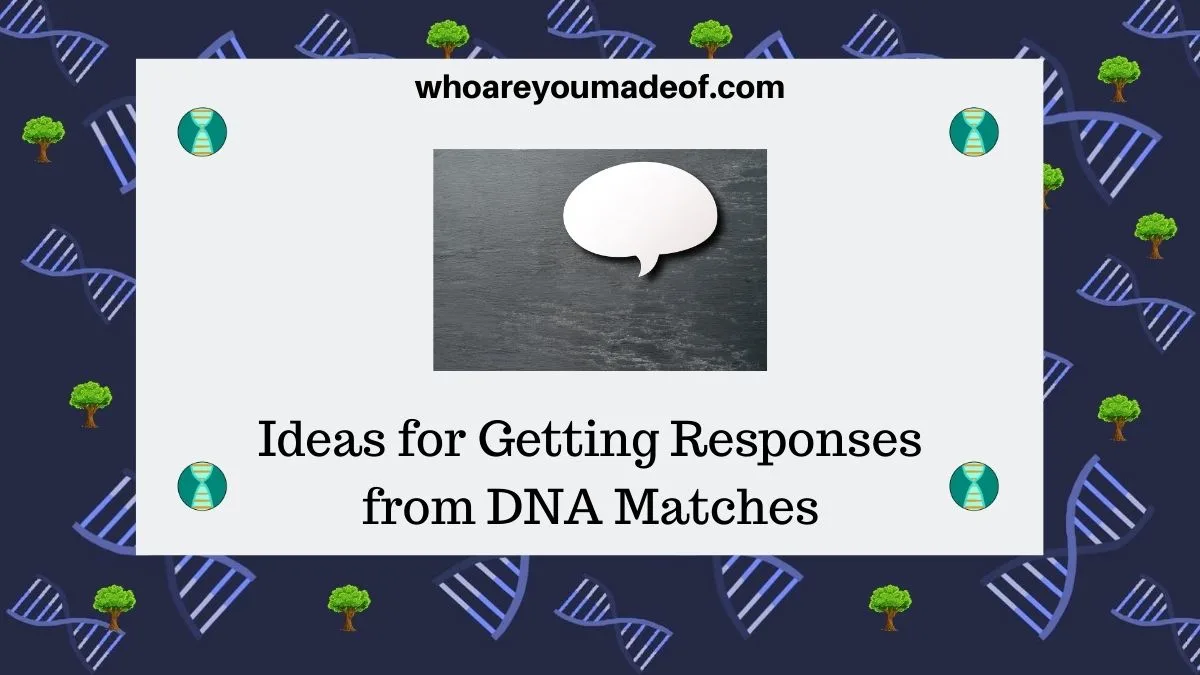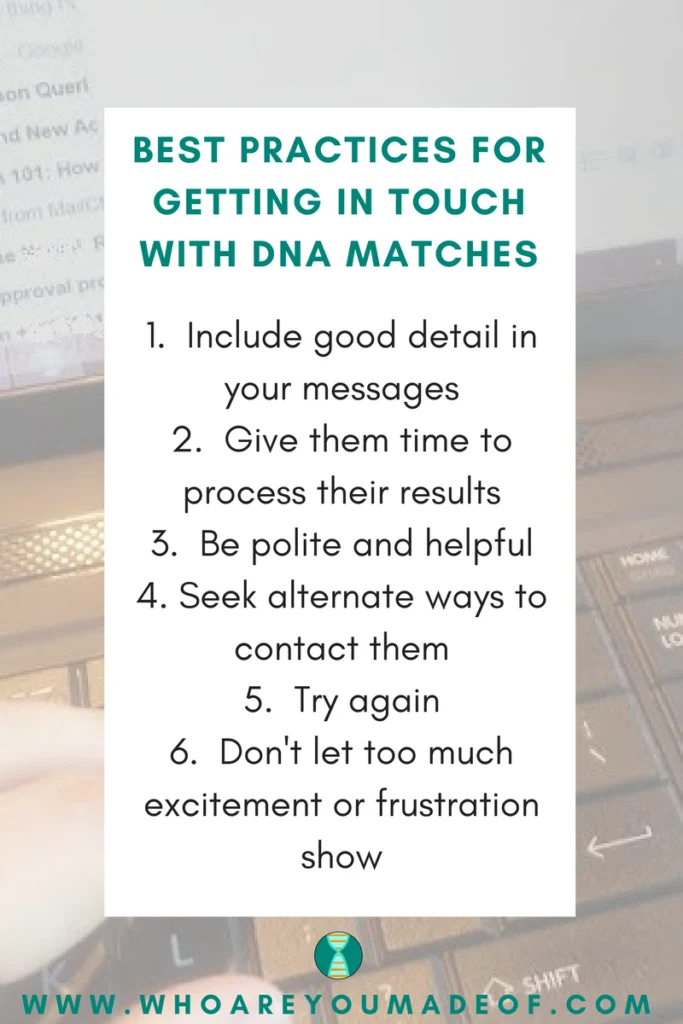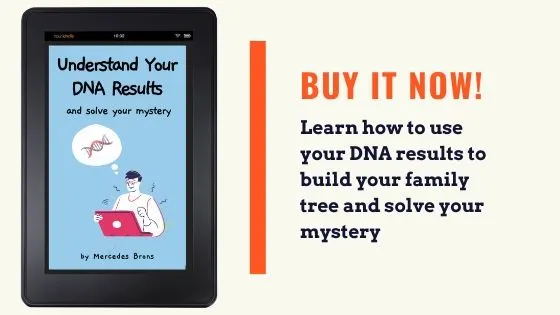If your DNA match hasn't responded, and you haven't given up hope that they someday might write you back, there are a few things that you can consider to improve the probability that they will write you back.
In this post, I've listed six secret tips that you can try to improve your chances that your messages are read and responded to.

How to improve chances of getting a response from DNA matches
I always get really excited when I see a new DNA match pop up - especially if they are relatively close, but it's so frustrating when I don't hear back. Has this ever happened to you? Over the years, I've learned the best ways to contact my matches and raise my probability of hearing back from them.
Below, find my top tips for making the most of your communication with your DNA matches and improving the chance that you will receive a reply in return.
Give them time to process their results
If you have a brand-new match show up, give them a few days to orient themselves with their results and process information before you contact them. If they feel overwhelmed, they are more likely to just ignore everything instead of responding to you.
I have personally made the mistake of contacting a brand-new, close DNA match on my mother's match list before the relative had even seen the DNA results. I was so excited, of course, but yikes!
It's hard to be patient and wait, but if after a few days the match has not reached out to you, feel free to message them using some of the ideas from this article.
Include good detail in your messages
Include details when you contact your matches. This can often help the person feel more comfortable responding to you, especially if they do not know much about their family tree.
Many people take DNA tests because they want to learn more about their ancestors or immediate biological relatives. If we contact our DNA matches with a very vague "let's figure out how we are related" message, this could be very overwhelming to our match.
I had a situation where I had an unknown first cousin show up for one of my parents. I had messaged her twice in three years and received no response.
When I first tested, I had no idea how she might be related, but as I learned more about how DNA is inherited and more shared matches were available to examine, I figured out exactly where she fell on my family tree. I decided to message her one last time, and this time, I included a few details about who I thought her grandparents were.
I received a response in less than five minutes! It turns out that she had been searching for her biological father for years, and had never responded to anyone because she thought she would not be able to help them.
It turns out I was able to help her and unite her with her father and many extended family members - AMAZING.
Be polite and helpful
Be polite, and try to help them as much as possible. Let them know what kind of information that you do have, and how you might be able to help each other.
You would be surprised at how rude or demanding people can be in their notes, and you definitely don't want to be one of "those people". I know that I have gotten my fair share of rude e-mails or messages demanding that I figure out the relationship (with no help or information from them!).
As the old saying goes, it's true that "you catch more flies with honey".
Try again
If you've only contacted them once, there is no harm in waiting for a few weeks, or longer, and trying again. If you have already sent them several messages in a short period of time, however, I would wait for a few months, or even longer, before trying again.
Many people who have been active in researching their DNA matches for many years have reported hearing back from a DNA match that they messaged 2, 3, or more years ago. This has happened to me, too.
So, it's perfectly fine to politely message once every year or two in the hopes that your relative didn't see your initial messages because they haven't logged in in a while. The only exception to this is if your DNA match has specifically asked you not to message them anymore, an uncommon situation, but worth mentioning.
If your DNA match has asked you not to contact them, then you should definitely respect this request.
Seek alternate ways to contact them
Consider trying to contact them outside of e-mail or your testing company's messaging system. Proceed with caution, however, since you don't want to come across as "creepy".
If you have an e-mail address, you can perform a search for their e-mail, and see if it comes up anywhere else on Google. If you have a username, you can try to search Google for that username and see if they are on any other social platforms, genealogy groups, etc.
People are often able to find their DNA matches on Facebook and have good success reaching out to them on this platform. A large number of people over the age of 30 are Facebook users, even if it is becoming less popular with the younger generations, and people who do use Facebook usually use it to send messages and communicate.
It's amazing what you can learn this way, and you just might be able to make contact. I want to emphasize again to only use this option if you feel confident that they just haven't gotten your messages (i.e. you can see that they haven't logged into their Ancestry account, etc)
Don't let too much excitement and frustration show
It's natural to feel excited when you see a new match, or frustration if you have already tried to contact someone and they haven't responded. There are many reasons that a DNA match might not respond immediately, and not everyone is as excited as we are about finding new relatives.
Since we don't know them, we don't know what they are going through, and we don't even know if they've seen your message(s).
It's best practice to write polite non-emotional e-mails and messages. The idea is to show that you are eager, but not pushy. We can express our interest without coming across as too eager, since this can sometimes turn people off (and we want them to respond).
Keep track of what you learn from your DNA matches
When you are corresponding with matches, you might learn a lot about lines of your family tree that you never knew existed. For example, you might learn that your great-great grandfather had a sister named Margaret, and your newly discovered DNA match is Margaret's granddaughter.
Adding Margaret and her descendants to your family tree is key to building a "wide" family tree. If you have a policy of always adding siblings of your ancestors, along with their descendants, to your family tree, you will have a more complete tree and you will be able to figure out who other DNA matches are (in relation to you) more easily.
If you aren't currently keeping track of your family tree in an organized manner, you should definitely consider building a family tree on Ancestry. It's free to build a tree and share it with family, and it's pretty easy to do.
If you want access to records and documents (highly recommended), you will need a subscription.

Conclusion
I hope that these ideas have helped you figure out the best way to contact your matches and get responses from them. Have you ever felt like your messages were being ignored, and if so, what did you do?
Did you decide to look them up online? I would love to hear from you in the comments!
Thanks for stopping by!


Steve
Wednesday 5th of April 2023
She is a 54-year-old Biological Daughter that I never knew about. We are separated by over 3,000 miles. But she did find me and I did finally respond back to her.
Steve
Wednesday 5th of April 2023
My daughter discovered me through Ancestry.com. Three years prior she had sent me a very nice letter and I rejected it as a scam. To give her closure I agreed to take a DNA test. When I saw the results, I contacted her. I wrote a book called 1+3=5 about it, it describes the whole situation. This is a very scary and unusual situation for anybody to deal with. But it can be very beautiful to experience unfolding.
Dane
Monday 27th of February 2023
I have been subscribed to four of the major DNA testing programs for nearly four years now. I've gathered probably close to 10,000 "cousins" of many geographic areas, some with names I probably can't or don't pronounce correctly. Of all that list of relatives I can't recall ever receiving even ONE contact message from any of them to me. Of the ones that I have started communicating with it was I who initiated the contact; not them. It's hard to believe that with all those names none of them has the interest, or courage, to initiate that 'hand reaching out to touch someone'... that has evidence-backed information that they are related. I am puzzled by my fellow humans.
Kristina
Sunday 26th of February 2023
These are all good ideas for contracting matches. I had one person contact me after I sent a second message inviting them to a Facebook group I’d just created for descendants of our shared ancestor. She said they hadn’t been notified about the first message. So she joined my Facebook group and also sent me more information about our shared Ancestry. I did get a little over-excited in one of my messages and haven’t gotten a response to that message. So I realize that I had gotten overeager and I’m thinking it may just be best to wait a week two before reaching out again. So thank you for your tip about keeping emotion out of your message. That is important!
Beth
Sunday 26th of February 2023
These are all good ideas. I have begun building private mirror trees, which is helping, a lot. After several years of not getting responses, I began adding details of their "Proposed family tree" I make my tree private and searchable. Eureka! Matches are now contacting me to inquire about my private trees. I write back and explain the tree is hypothetical and welcome their input.
I invite them to participate in the tree. It's working for me.